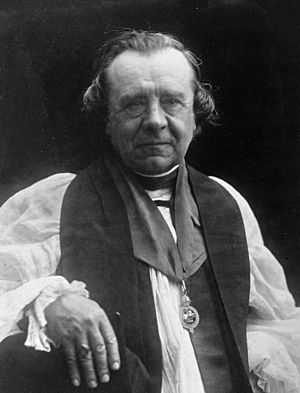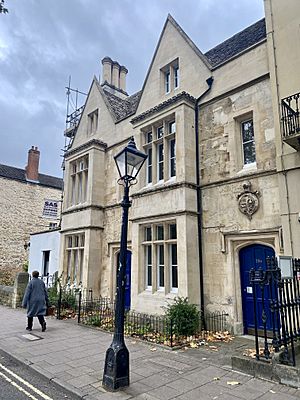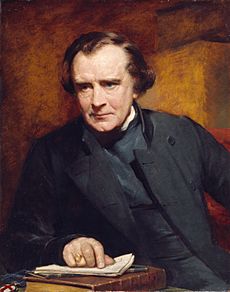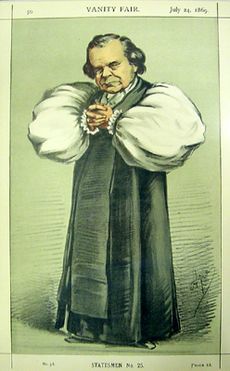Samuel Wilberforce facts for kids
Quick facts for kids Samuel Wilberforce |
|
|---|---|
| Bishop of Winchester | |

Photograph by Julia Margaret Cameron
|
|
| Church | Church of England |
| See | Winchester |
| In Office | 1870–1873 |
| Predecessor | Charles Sumner |
| Successor | Harold Browne |
| Orders | |
| Ordination | 1828 |
| Personal details | |
| Born | 7 September 1805 Clapham Common, London, England |
| Died | 19 July 1873 (aged 67) Dorking, Surrey, England |
| Previous post | Bishop of Oxford Dean of Westminster |
| Education | Oriel College, Oxford |
Samuel Wilberforce (born September 7, 1805 – died July 19, 1873) was an important English bishop in the Church of England. He was the third son of William Wilberforce, who was famous for fighting against the slave trade.
Samuel Wilberforce was known as "Soapy Sam" because of his smooth speaking style. He was one of the best public speakers of his time. Today, he is most remembered for arguing against Charles Darwin's theory of evolution in a famous debate in 1860.
Contents
Early Life and Education
Samuel Wilberforce was born in Clapham Common, London. He was the fifth child of William Wilberforce, a leading figure in the fight to end slavery. His mother was Barbara Spooner.
Samuel was taught at home, focusing on classic subjects like Latin and Greek. This was the way his father wanted his sons to learn.
In 1823, Samuel went to Oriel College, Oxford, a famous university. There, he joined a debating club and showed his skills in speaking. He became friends with future important people like William Ewart Gladstone, who would later become Prime Minister.
Samuel was good at his studies. In 1826, he earned a top degree in mathematics and a good degree in classics.
After university, he married Emily Sargent in 1828. He then became a deacon in the Church of England. In 1829, he became a priest and started working at a church in Checkendon.
A Busy Church Career
In 1830, Samuel Wilberforce became the rector of St Mary's Church, Brighstone, on the Isle of Wight. He quickly moved up in the church. By 1839, he was an archdeacon, and in 1840, he became a canon of Winchester.
In 1841, he was chosen to be a chaplain to Prince Albert, the Queen's husband. This was because of a speech he gave against slavery.
In 1845, Samuel Wilberforce became the Dean of Westminster, a very important church role. Later that year, he was made the Bishop of Oxford. As bishop, he worked hard to improve churches. He helped raise money to build and fix many churches in his area. He also opened a college for training priests called Ripon College Cuddesdon.
After 24 years as Bishop of Oxford, he moved to become the Bishop of Winchester in 1869. This was another very important position in the Church of England.
Why He Was Called "Soapy Sam"
Samuel Wilberforce was nicknamed "Soapy Sam." This might have been because he often rubbed his hands together, as shown in a famous cartoon. Another reason could be that his speeches were very smooth and persuasive, almost like soap.
He was also known as the "bishop of society" because he spent time with important people. However, he also worked hard in the House of Lords, discussing important social and church issues.
His Death
Samuel Wilberforce died on July 19, 1873, in a horse-riding accident near Abinger. He was on his way to visit his friend, William Gladstone. He was buried in East Lavington with his wife.
His Writings
Samuel Wilberforce wrote many books and sermons. Some of his works include:
- Agathos and other Sunday Stories (1839) – a collection of stories.
- Rocky Island and other Parables (1840) – more stories.
- Life (1838) of his father, William Wilberforce, which he wrote with his older brother Robert.
- Heroes of Hebrew History (1870) – about important figures from the Bible.
He also kept a diary. This diary showed a more gentle and religious side of him, which many people didn't see because of his busy public life.
Legacy and Family
Samuel Wilberforce supported Philip Reginald Egerton, who started Bloxham School in Oxfordshire. One of the boarding houses at the school is named after Wilberforce.
He and his brother Robert also joined the Canterbury Association, which helped set up a new settlement in New Zealand. The Wilberforce River in New Zealand is named after them.
Samuel and his wife Emily had five children who lived to be adults:
- Emily Charlotte (1830–1917): Their daughter, who later became Catholic.
- Herbert William Wilberforce (1833–1856): A Royal Navy officer.
- Reginald Wilberforce (1838–1914): An army officer.
- Ernest Wilberforce (1840–1908): Also became a bishop, serving in Newcastle and Chichester.
- Basil Wilberforce (1841–1916): Became a canon and archdeacon at Westminster.
In Books
Samuel Wilberforce is shown as a character in Anthony Trollope's novel The Warden (1855). In the book, he is called Samuel and nicknamed Soapy, and is shown as charming but not always trustworthy.
Images for kids
-
Photograph by Julia Margaret Cameron
 | Percy Lavon Julian |
 | Katherine Johnson |
 | George Washington Carver |
 | Annie Easley |








